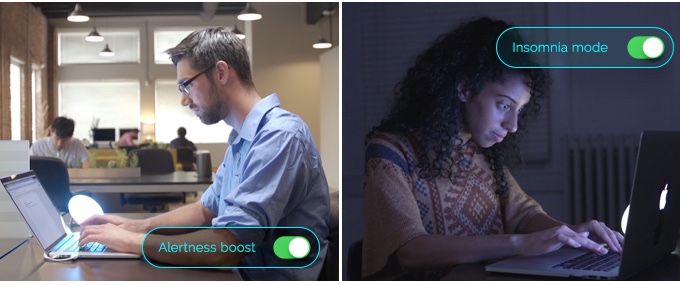Sleep is an essential component of life for everyone. However, insomnia and other sleep disorders often make it difficult for users to live a healthy lifestyle. While there’s no shortage of sleep trackers on the market which claim to assist with sleep, their biggest limitations are that they require users to wear them while in bed. The makers of Circadia are looking to change that with their contactless sleep tracker inspired by NASA to re-sync the user’s body clock throughout the day. The system takes a three-pronged approach to improving user sleep with the sleep tracker, a therapy lamp, and sleep app.
In order to work without any contact with the user, the device uses radar technology which Is fully certified by the FCC, guaranteeing the safety of the sleep tracker. In terms of accuracy, there’s up to 91.5% sleep staging accuracy in subjects with no sleep disorders, and 98% accuracy for respiration monitoring.
The device is built around the theory that by nature, bodies are programmed to run in sync with the natural light of the sun which changes patterns throughout the day. Most individuals, however, spend 90% of their daily lives indoors, under an artificial light which doesn’t mimic the light of the sun.
To determine the optimal wake-up time the integrated alarm maps the user’s current sleep cycle and matches it against the desired wake up time in real-time. This is done with a combination of two of the most natural wake-up options.

The first approach is light. To do this a built-in dawn simulating wake up light triggers 15-30 minutes before the ideal wake up time to help users wake up naturally. The second approach is through sound. A customizable audible alarm enables users to set their favorite wake up sounds (be it Spotify, sounds such as birds chirping, a radio station, or a buzzer).
There are a few core benefits to using Circadia. The first being reduced morning grogginess. By using data from the users’ sleep, the therapy lamp creates a personalized light therapy program from the second the user wakes up. For the day and night, there are two modes, alertness and insomnia to serve as a shot of “visual caffeine” during the day and additional assistance to keep users awake when they need to work late at night.

Finally, there’s also the jet lag mode which enables users to adjust their body clock, before, during, and after during their travel. This is possible since the device is pocket-sized, like a small Moleskine notebook.
The science behind the therapy lamp revolves around the idea that light is the biggest external factor that controls the user’s body clock. It controls mood, energy, and performance throughout the day by regulating the release of hormones such as melatonin (which triggers drowsiness) and cortisol (which keeps users alert).

Circadia is built to work with leading services/devices such as Fitbit, IFTTT, Spotify, MyFitnessPal, Nest, Amazon Alexa, and Apple HomeKit.
The main features of the device include the ability to monitor heart rate, respiration, temperature, humidity, along with snoring detection.
To date, the makers of Circadia have raised over $116,000 via crowdfunding, surpassing their stated goal of $100,000. Pricing for the therapy lamp starts at $99 which is $30 less than the retail price of $129. The contactless sleep tracker sells for $129 which is $40 less than the retail price of $169. The estimated shipping date of Circadia is April 2018.

